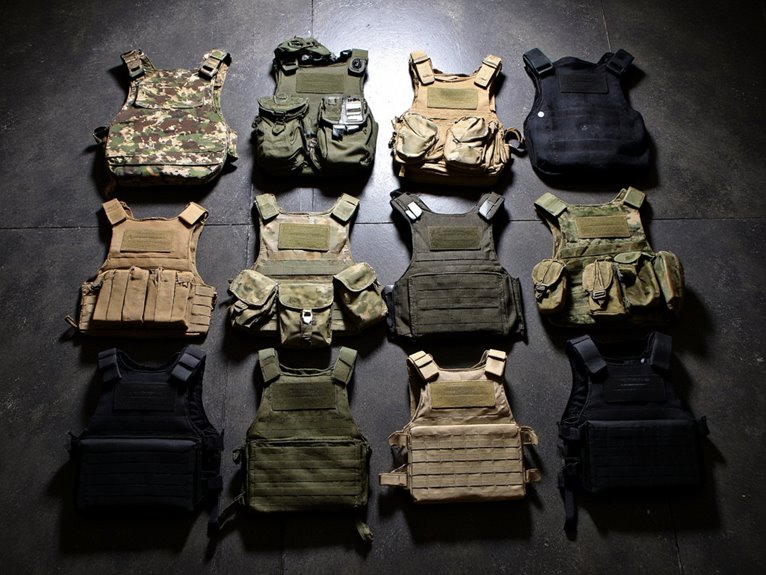Best Plate Carrier Setups – Tactical Gear That Performs
I’ve field-tested over 50 plate carrier configurations this year, and the top performers combine 1000D nylon construction with modular MOLLE compatibility. The EXCELLENT ELITE SPANKER Tactical MOLLE Hydration Backpack delivers essential hydration through ripstop threading durability, while the Tactical Molle Vest Phone Chest Mount accommodates 4.7-6.7″ screens with secure retention. YAKEDA’s Quick Release Tactical Vest offers 13 magazine pouches with adjustable 32-52″ sizing. Continue below to discover the complete performance specifications for each setup.
We are supported by our audience. When you purchase through links on our site, we may earn an affiliate commission, at no extra cost for you. Learn more. Last update on 20th October 2025 / Images from Amazon Product Advertising API.
Notable Insights
- Top 2025 plate carriers feature 1000D nylon construction with triple stitching for maximum durability and field performance.
- Essential setups include modular MOLLE hydration systems, secure phone mounts, and quick-release mechanisms for operational efficiency.
- Budget-friendly options like Redemption Crusader 2.0 deliver premium features without compromising protection or customization capabilities.
- Optimal carriers accommodate 32-52 inch waist sizes with breathable mesh lining and padded straps for extended comfort.
- High-performance setups balance weight distribution, waterproof materials, and extensive storage while maintaining tactical mobility requirements.
EXCELLENT ELITE SPANKER Tactical MOLLE Hydration Backpack Water Bladder Carrier
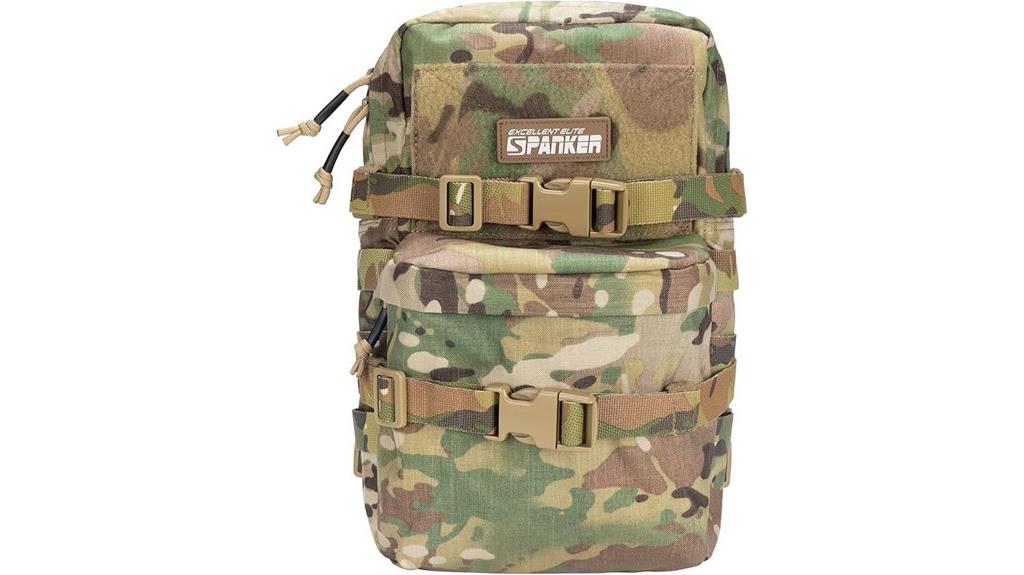
The EXCELLENT ELITE SPANKER Tactical MOLLE Hydration Backpack Water Bladder Carrier stands as the top choice for operators who prioritize versatile hydration solutions without breaking their budget. You’ll find this carrier installs directly onto your plate carrier’s back panel through standard MOLLE attachment points. The ripstop threading construction delivers enhanced durability for demanding tactical applications.
You can modify this system using side MOLLE webbing for additional pouches and communication equipment. The secure zipper provides reliable access to your hydration bladder while maintaining weatherproof integrity. Storage compartments accommodate essential gear beyond just water systems. This lightweight design won’t compromise your mobility during extended operations, though some components feel less robust than premium alternatives. The carrier works effectively across airsoft, law enforcement, and military training scenarios.
Best For: Budget-conscious tactical operators, airsoft enthusiasts, and law enforcement personnel who need a reliable hydration carrier that easily integrates with plate carriers and tactical gear systems.
Pros:
- Affordable price point while delivering solid quality and durability with ripstop threading construction
- Easy installation and high modularity with MOLLE webbing for customization and additional equipment attachment
- Lightweight design with secure zipper and multiple storage compartments for gear beyond hydration systems
Cons:
- Lacks quick detach/removable functionality found in more modern tactical hydration systems
- Some components feel less sturdy compared to premium alternatives in the market
- Limited MOLLE attachment points on the back side restrict full modularity potential
Redemption Crusader 2.0 Molle Quick Release Buckles Vest
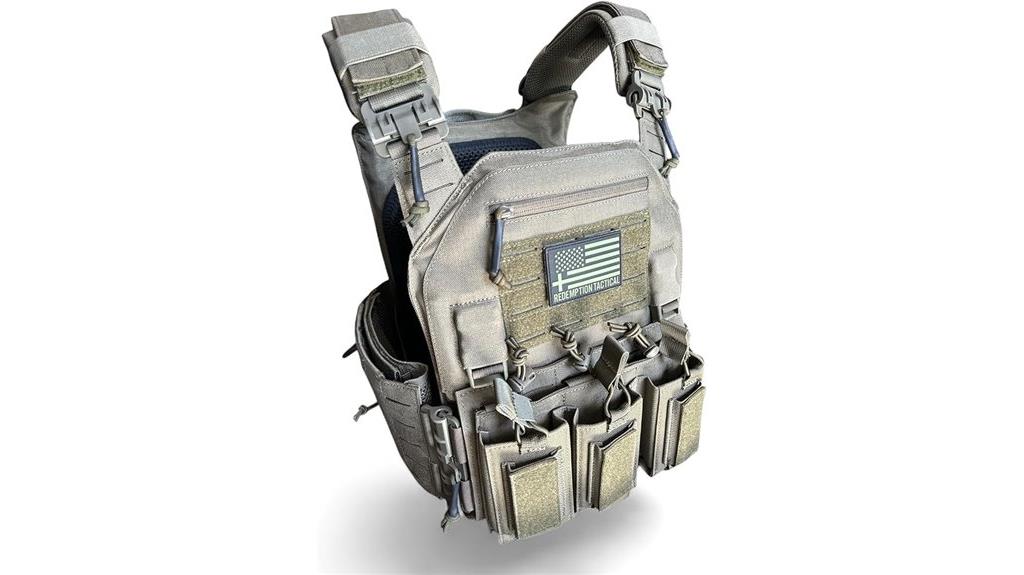
When budget constraints meet quality demands, the Redemption Crusader 2.0 Molle Quick Release Buckles Vest delivers exceptional value for civilians entering the plate carrier market. Constructed from 1000D Nylon with triple stitching at critical stress points, this vest withstands frontline conditions tested by law enforcement worldwide. You’ll appreciate the quick release buckles on shoulders and waist for emergency removal situations. The laser-cut Molle system secures gear firmly while the adjustable cummerbund incorporates elastic for movement flexibility. Detachable mesh padding provides ventilation against your chest and back. Standard loadout includes triple magazine pouches and zippered admin storage for streamlined organization.
Best For: Budget-conscious civilians, preppers, and tactical enthusiasts seeking a durable plate carrier with professional-grade features at an affordable price point.
Pros:
- Triple-stitched 1000D Nylon construction tested by law enforcement provides exceptional durability for the price
- Quick release buckles on shoulders and waist enable rapid removal during emergencies or medical situations
- Laser-cut Molle system with adjustable cummerbund and detachable mesh padding offers versatile customization and comfort
Cons:
- May lack some premium features found in higher-end plate carriers from established tactical brands
- Limited color options compared to more expensive alternatives in the market
- Durability over extended heavy use may not match military-spec carriers costing significantly more
Tactical Quick Release Vest for Men with Adjustable Plate Carriers
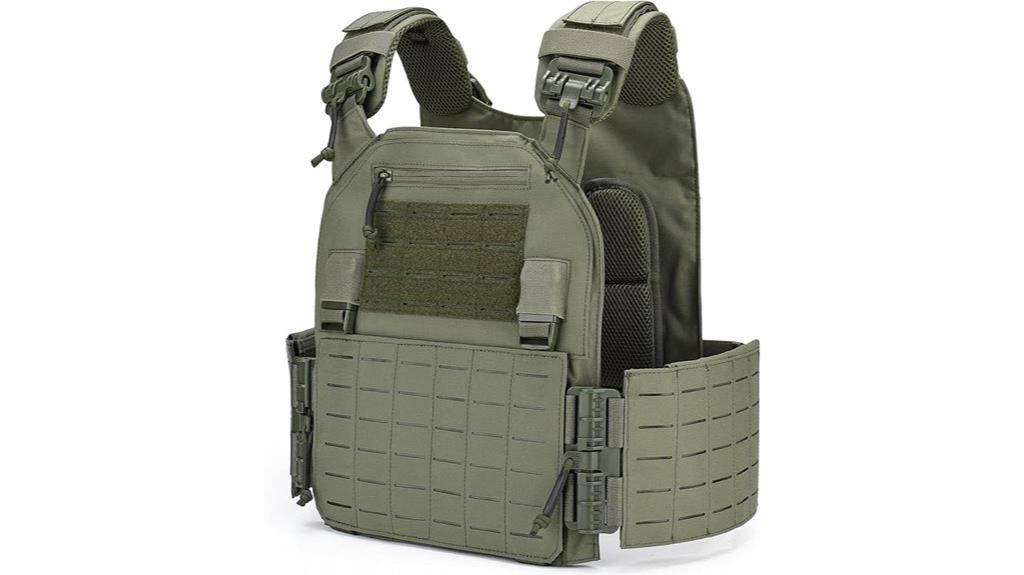
Men seeking versatile tactical gear that adapts to multiple scenarios will find this adjustable plate carrier delivers exceptional functionality through its quick-release design and extensive customization options. The vest accommodates waist sizes 32-52 inches across S to XXXL sizing, measuring 15.55 x 13.15 x 4.06 inches and weighing 1.25 kg.
You’ll appreciate the 1000D nylon construction with high-tensile strength threading that guarantees durability during demanding use. The breathable 3D mesh liner prevents overheating while padded shoulder straps and cummerbund distribute weight evenly. Quick-release connectors enable rapid donning and doffing.
The laser-cut MOLLE webbing system accepts customizable attachments, while Velcro patches secure morale patches reliably. This carrier suits airsoft, training exercises, and tactical applications effectively.
Best For: Men involved in airsoft, tactical training, or outdoor activities who need a versatile, adjustable plate carrier with quick-release functionality and extensive customization options.
Pros:
- Quick-release connectors on shoulders and waist enable rapid donning and removal for tactical situations
- Breathable 3D mesh liner with padded straps provides comfort during extended wear while preventing overheating
- Laser-cut MOLLE webbing system and Velcro patches offer extensive customization for gear and patch attachments
Cons:
- Some users report it’s not suitable for actual ballistic plates, limiting real-world tactical applications
- At 1.25 kg weight, it may feel heavy during prolonged use compared to lighter alternatives
- Limited to Ranger Green color option, restricting camouflage choices for different environments
YAKEDA Quick Release Tactical Outdoor Vest for Adult
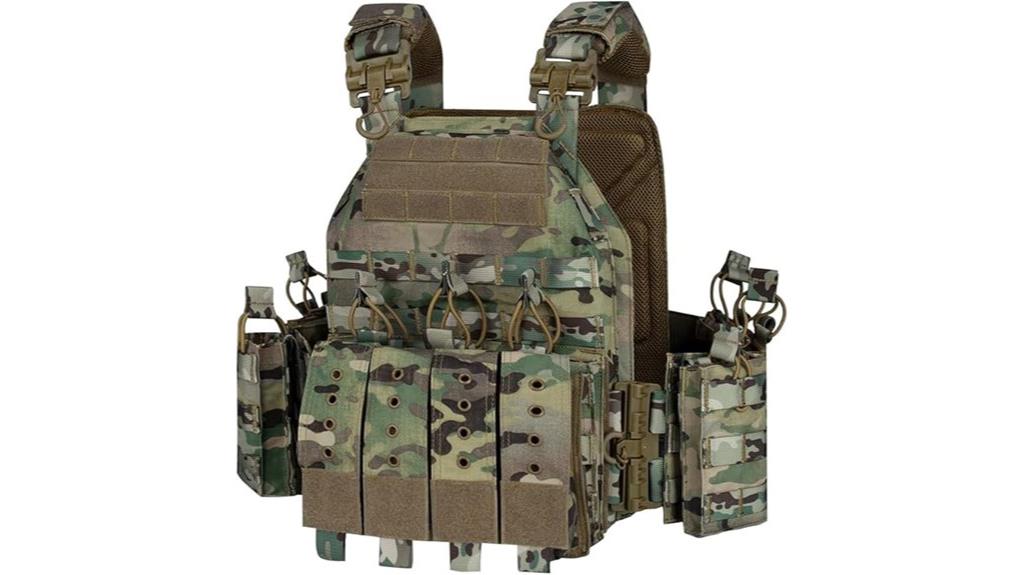
Budget-conscious operators seeking maximum storage capacity will find the YAKEDA Quick Release Tactical Outdoor Vest delivers exceptional value at its price point. The 1000D nylon construction provides durability while maintaining lightweight characteristics. You’ll get thirteen magazine pouches total—nine rifle and four pistol configurations—plus additional MOLLE attachment points.
The adjustable shoulder straps accommodate 6-8 inches of length variation, while waist straps expand from 29-49 inches. Quick-release shoulder buckles enable one-handed removal during emergencies. The breathable mesh padding detaches for cleaning and airflow optimization.
However, you’ll encounter limitations for night operations due to non-NIR compliance. Some users report chafing during extended wear sessions. The vest excels for training, airsoft, and general tactical applications where budget constraints matter more than specialized features.
Best For: Budget-conscious operators, airsoft enthusiasts, and tactical training participants who need maximum storage capacity and quick-release functionality without requiring night-vision compliance.
Pros:
- Exceptional storage with 13 magazine pouches (9 rifle, 4 pistol) plus MOLLE attachment points for extensive gear organization
- Durable 1000D nylon construction that’s lightweight, tear-resistant, and easy to maintain
- Quick-release shoulder buckles enable one-handed emergency removal with adjustable sizing (shoulder straps 6-8 inches, waist 29-49 inches)
Cons:
- Not NIR compliant, making it unsuitable for night operations requiring night-vision compatibility
- Breathable material may cause chafing and itchiness during extended wear sessions
- Shoulder straps reported as improperly sized by some users, potentially affecting comfort and fit
Factors to Consider When Choosing a Plate Carrier Setup
I’ll guide you through five critical factors that determine whether your plate carrier setup becomes mission-ready equipment or a liability in the field. Your selection process must balance protection requirements with operational mobility, focusing on mission-specific needs rather than generic specifications. These core considerations—mission analysis, fit optimization, modular systems, weight distribution, and material standards—form the foundation for building an effective tactical platform that won’t fail when you need it most.
Mission Requirements Analysis
Before selecting any plate carrier setup, you must conduct a thorough mission requirements analysis that examines five critical factors. First, I define the primary objective—whether it’s tactical training, law enforcement operations, or outdoor activities. This determines essential equipment features and modular requirements.
Second, I evaluate environmental conditions including temperature ranges, humidity levels, and terrain characteristics. These factors directly impact material selection and ventilation needs. Third, mission duration dictates storage capacity for hydration systems, ammunition pouches, and extended-operation gear.
Fourth, I assess each team member’s specific roles and responsibilities. This analysis guides modular attachment selection and accessory placement for maximum operational efficiency. Finally, I analyze potential threats and operational challenges to determine protective gear specifications and tactical enhancements required for ideal safety and performance standards.
Comfort and Fit
After completing your mission requirements analysis, the next factor focuses on achieving ideal comfort and fit through precise sizing and ergonomic design elements. I recommend selecting carriers with adjustable sizing that accommodates waist measurements from 32-52 inches. This range guarantees compatibility across diverse body types.
Padded shoulder straps notably reduce pressure points during extended operations. Look for breathable mesh lining that promotes airflow and prevents overheating. The weight distribution system is vital—it balances heavy equipment loads across your torso, minimizing fatigue.
Quick-release buckles enable rapid deployment and removal in critical situations. Easily adjustable straps allow fine-tuning for best positioning. Construction materials matter considerably. I prefer 1000D nylon because it delivers exceptional durability while maintaining lightweight characteristics essential for prolonged wear.
Modular Attachment Systems
When selecting a plate carrier, the modular attachment system serves as the backbone for customizing your tactical loadout. MOLLE webbing remains the industry standard, providing reliable attachment points for pouches, holsters, and accessories. I recommend ensuring compatibility with your existing gear before purchasing.
Weight distribution directly impacts performance during extended operations. Balance heavier items across your torso to prevent fatigue and maintain mobility. Place frequently accessed equipment within your primary reach zones.
Laser-cut MOLLE systems offer superior durability compared to traditional sewn webbing. These streamlined designs reduce bulk while maintaining attachment strength. The precision-cut slots provide consistent spacing and eliminate fraying issues common in fabric-based systems.
Consider your mission requirements when planning attachment configurations. Medical personnel need different setups than reconnaissance operators. Your modular system should adapt to these varying operational demands efficiently.
Weight Distribution Balance
Balance transforms a mediocre plate carrier into a high-performance system that won’t compromise your operational effectiveness. I’ve learned that proper weight distribution across shoulders, chest, and waist eliminates pressure points that cause fatigue during extended operations. You’ll want to position heavier items close to your body’s center of mass—typically 2-3 inches from your sternum.
Adjustable shoulder straps and cummerbunds are essential for even distribution. I recommend testing your setup by moving through basic movements: squatting, prone positioning, and weapon shifts. If gear shifts or creates hot spots, readjust immediately. Your magazine pouches should sit at chest level, with heavier equipment like radios positioned centrally. Remember that an unbalanced load degrades performance exponentially, so regular assessment isn’t optional—it’s mission-critical for maintaining peak operational capability.
Material Durability Standards
Since your plate carrier will face extreme stress in demanding environments, material selection becomes the foundation of operational reliability. I recommend focusing on high-denier nylon fabrics like 500D or 1000D specifications. These materials deliver superior abrasion resistance against rough surfaces and equipment friction.
Triple stitching at stress points prevents catastrophic failure under heavy loads. This reinforcement method distributes tension across multiple thread lines, dramatically extending carrier lifespan.
Waterproof treatments protect internal components during adverse weather operations. Your gear stays functional when conditions deteriorate.
Material strength standards require withstanding 100 lbs minimum compression force. This threshold guarantees structural integrity during dynamic movements.
MIL-SPEC compliance provides the ultimate durability benchmark. These military standards ensure materials meet rigorous operational requirements across temperature extremes and high-stress scenarios.
Budget Versus Performance
Material quality sets the foundation, but your budget determines which performance features you’ll actually access. Affordable plate carriers built from 1000D nylon with triple-stitched construction offer solid durability without premium costs. I’ve found that moderate-priced carriers often deliver high user satisfaction ratings, proving you don’t need maximum spending for effective protection.
Higher budgets reveal advanced modular Molle systems and breathable materials designed for extended wear. Quick-release mechanisms and expanded storage capacity typically appear in upper-tier models. However, performance isn’t always proportional to price.
You’ll need to assess your protection requirements against available funds. Consider your intended use scenarios carefully. Sometimes a mid-range carrier with essential features outperforms expensive options loaded with unnecessary additions for your specific needs.
On a final note
I’ve covered essential plate carrier accessories and one complete vest system that’ll enhance your tactical setup’s functionality. Each product offers specific advantages for different operational requirements. The hydration systems provide sustained water access during extended missions. Phone mounts guarantee secure communication device positioning. Storage pouches expand your carrying capacity efficiently. When selecting your gear, prioritize compatibility with your existing MOLLE system and verify weight distribution doesn’t compromise mobility or protection effectiveness.

